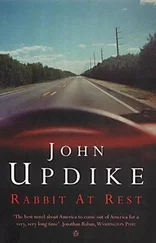John Updike - Rabbit Remembered
Здесь есть возможность читать онлайн «John Updike - Rabbit Remembered» весь текст электронной книги совершенно бесплатно (целиком полную версию без сокращений). В некоторых случаях можно слушать аудио, скачать через торрент в формате fb2 и присутствует краткое содержание. Жанр: Современная проза, на английском языке. Описание произведения, (предисловие) а так же отзывы посетителей доступны на портале библиотеки ЛибКат.
- Название:Rabbit Remembered
- Автор:
- Жанр:
- Год:неизвестен
- ISBN:нет данных
- Рейтинг книги:5 / 5. Голосов: 1
-
Избранное:Добавить в избранное
- Отзывы:
-
Ваша оценка:
- 100
- 1
- 2
- 3
- 4
- 5
Rabbit Remembered: краткое содержание, описание и аннотация
Предлагаем к чтению аннотацию, описание, краткое содержание или предисловие (зависит от того, что написал сам автор книги «Rabbit Remembered»). Если вы не нашли необходимую информацию о книге — напишите в комментариях, мы постараемся отыскать её.
Set 10 years after Harry "Rabbit" Angstrom's death, Rabbit Remembered returns listeners to the small Pennsylvania town where Harry's widow, Janice, and his son, Nelson, still reside. They are faced with a surprise when Annabelle, Harry's 39-year-old illegitimate daughter, arrives on the scene, bringing with her ghosts from the past.
Rabbit Remembered — читать онлайн бесплатно полную книгу (весь текст) целиком
Ниже представлен текст книги, разбитый по страницам. Система сохранения места последней прочитанной страницы, позволяет с удобством читать онлайн бесплатно книгу «Rabbit Remembered», без необходимости каждый раз заново искать на чём Вы остановились. Поставьте закладку, и сможете в любой момент перейти на страницу, на которой закончили чтение.
Интервал:
Закладка:
Everybody passes. Doris glances around suspiciously and says, "There must have been some points out there. I had only three, a jack and a queen."
While Norma redeals the cards Janice dares ask her, "Norma, are you by any chance a relation of a Linda Hammacher? She and I worked at Kroll's together, back in the Fifties."
Norma pauses, the cards freezing in her hands. "I had a second cousin Linda."
"Where is she now?"
"She died."
"Oh no! Well, I guess we're getting to that age."
"It was years ago. She was young, relatively. It was rather mysterious."
"How so?" Janice asks.
"Some said of AIDS, though the paper said just of a long illness. Her family didn't like to talk about it. She had been married and divorced."
"Oh dear," Janice says, truly shocked; a piece of remembered happiness has been poisoned.
"It was very tragic," Norma pronounces. "Damn. Count your cards. I should have the last one, and I don't."
As if to comfort Janice for having distracted the dealer, Amy during the next deal fills her in on the latest twist in the saga of a great parcel of land in the east of Diamond County, six thousand acres once held by Bethlehem Steel for its low-grade iron content and now sold to a Canadian developer who, tired of battling his farmer neighbors on every proposed development, had, all legally, turned this bit of William Penn's woods into a borough, with forty voting citizens, all but three of them company employees. Already they had voted in a managed landfill that would take four hundred tons a day of Philadelphia's garbage, trucked up the Turnpike in caravans of garbage trucks, and a water park involving a pool the size of a football field and a hundred-fifty-foot-high rubber-raft ride and an illuminated par-three golf course. "Now they're talking of a ten-story retirement-home complex and a half-mile racetrack for these little miniature racing cars that apparently are all the rage in Maryland," Amy says.
"Well," Janice says, "I guess it's the future."
Doris didn't quite hear and crabbily says, "Are you talking about the Y2K bug? Deet says it's all been overblown, to whip up more income for the computer companies."
Norma says, "Two clubs. At least I think that's what I'm supposed to say when I have a powerhouse."
Janice from her hand sees she will not have to bid, no matter what Doris bids, and in quiet celebration eats a few sugar-toasted peanuts from the pale-green porcelain bowl Doris and Deet had bought in China when they took a tour there last fall, set on a round-topped carved table they also bought there-the Chinese love to ship, even stone lions weighing as much as a boulder, in fact they will even ship boulders, they see a lot of beauty in boulders, Doris has told them-and which matches another carved table at the corner opposite for the other two players, to hold Waterford crystal water glasses and these bowls and Doris's ashtray (you can't complain since she's the hostess, blowing smoke into all of their lungs), while she thinks of how Harry used to love nibbly things, to the point where it killed him, and of how women like Doris are so fanatic about keeping a home up, a place for everything and everything in its place. She could never be like that, making a false religion out of your furniture. Even her mother hadn't been like that, though she liked nice things once Daddy began to make money at the lot. It's a kind of bullying, all these expensive shipped souvenirs of their expensive foreign trips on display, stacking up like the jewelry on Doris's hands from her previous marriages, cleaning ladies coming in to dust them like museum attendants.
For the last two rounds Doris offers them vermouth in little glasses with rose-tinted stems from Venice, and by the time she is at the door saying goodbye and see you in a week Janice wonders how she could ever have been so down on dear old Doris, who has had her to her lovely home so often and gave her so much good advice during those harrowing years with Harry.
Harry, Harry, he was the problem, Janice decides, that girl showing up claiming to be his daughter, no wonder she couldn't concentrate on the bridge, losing a dollar seventy cents and going down two on a three-no-trump bid Doris explained to her she could have made easily if only she had kept her diamond stopper. He made these messes but never cleaned up after himself, even now, dead, ten years, leaving it up to the living.
Brewer pours by her in her Le Baron, a river of bricks and signage. People use that word in planning-board hearings as to whether or not there is too much of it; real-estate values shoot up when a community cuts down on signage and buries its electric wires. Janice halts at stoplights and then the flow resumes, a stream of sights deepened by a lifetime's familiarity. She crosses the Weiser Street Bridge, with its cast-iron light stanchions and its plaque naming some dead mayor whose name never took. As a girl she always wondered why the bridge didn't arch up in the air like the Running Horse Bridge a half-mile to the south did, or slant down to the Brewer side like the Youngquist Boulevard Overpass to the north did. The river was shallowest here. A ford in this spot started the settlement in Indian days. In her girlhood the river was solid black with dunes of coal silt. They cleaned that up decades back so that now motorboats use the water and some people swim and even the fish are back. Nineteenth-century industrial cities, she remembers sad-looking Mr. Lister telling them in the realty class on Property and Development Law, made a big mistake by turning their backs on their waterfronts. Now soon it will be another century yet, with its own mistakes, no doubt. She drives straight up Weiser past the white brick sprawl of the Schoenbaum Funeral Directors, it used to be a single small office, with gloomy conical evergreens out front. She wonders how much longer she can stay out of their clutches, with Mother's long-lived Koerner genes fighting Daddy's shorter-lived ones. On the west side of Weiser Square the new four-story shopping center with its glass-enclosed atrium for concerts and civic affairs still hasn't attracted the shops and eateries the planners promised. Along the east side the buildings are much as she remembers them from girlhood; though the facades have been changed over the years and a number have their plate glass boarded up or whited out from the inside, she can recognize the broad windows of what had been Schaechner's Furniture and the narrowing shape of the entrance to Arnold's Footgear, where her mother would take her for patent-leather party shoes and where at a machine you could see the bones of your feet move in a ghostly green light that it turns out gave you cancer. These buildings, two whole blocks of them, above the first floor have windows with decorative brick frames and arches and elaborate overhangs at the top, like castles of a kind. The biggest, Kroll's main rival as a downtown department store, still has its name enduring in painted script a story high on the side that shows: Fineman's, where the cool basement restaurant was such an attraction for weary shoppers and the teen clothing on the fourth floor was a little more "New York" than in Kroll's, a little sharper and more frisky-tight angora sweaters in ice-cream shades, broad cinch belts in shiny fake leather, slinky nylon blouses, wool skirts that came down almost to your socks and tugged on your hips with their swaying weight, making you feel more feminine. "New York" was a way of saying "Jewish" but even Mother with all her prejudices admitted the cut and fabric of the dresses at Fineman's was better, and she could never resist the butterscotch sundaes in the basement restaurant. As a child Janice was enchanted by the open-scrollwork elevators and the vibrating wire tracks sending money and receipts rattling around on the ceiling. All that, all that fragrant luxury of appetizing goods, gone, just a fading name on an empty building, Fineman's.
Читать дальшеИнтервал:
Закладка:
Похожие книги на «Rabbit Remembered»
Представляем Вашему вниманию похожие книги на «Rabbit Remembered» списком для выбора. Мы отобрали схожую по названию и смыслу литературу в надежде предоставить читателям больше вариантов отыскать новые, интересные, ещё непрочитанные произведения.
Обсуждение, отзывы о книге «Rabbit Remembered» и просто собственные мнения читателей. Оставьте ваши комментарии, напишите, что Вы думаете о произведении, его смысле или главных героях. Укажите что конкретно понравилось, а что нет, и почему Вы так считаете.












